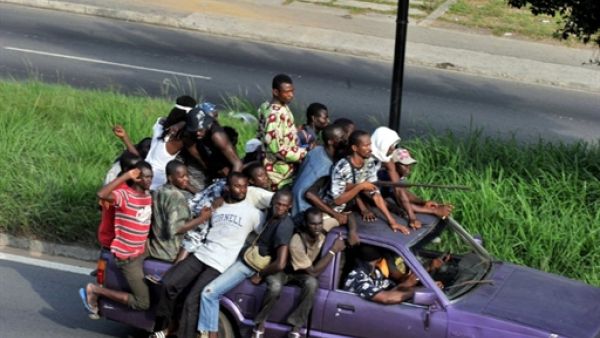Thousands of Lebanese in Ivory Coast are living in fear as the West African nation plunges further into a catastrophic civil war, but evacuation efforts thus far have only managed to rescue a few hundred people.
A Middle East Airlines flight scheduled to leave Beirut for Abidjan Friday morning was canceled when a curfew was declared as President-elect Alassane Ouattara’s forces advanced into the city.
More than 90 percent of the Lebanese community lives in the country’s main city Abidjan, where clashes and riots have brought chaos to the lives of thousands of people since the conflict began in Ivory Coast.
The curfew was lifted late Friday and an MEA plane is due to land Saturday morning in Abidjan, and local authorities are working with French officials to address the evacuation crisis.
A high-ranking public official at the Foreign Ministry said the Lebanese community was not being singled out for acts of violence, amid reports of looting and chaos in Abidjan. “The targets of the looting are not only Lebanese but also Ivorian,” the director general of the Foreign Ministry, Haitham Joumaa, told The Daily Star Friday.
“Looting and lawlessness has swept through the Ivorian cities but there is no specific danger to the Lebanese community,” Joumaa added, in response to reports that the Lebanese community was falling victim to looting and other crimes.
However, businesswoman Line Fakih said that the city was unsafe for anyone not carrying arms, and that the government has been traditionally unable to provide help. “The situation here is very dangerous, and we cannot leave our houses,” Fakih told The Daily Star in a telephone call Friday.
Asked whether the Lebanese community was offered any assistance by the authorities in Beirut, Fakih said that “they [Lebanese government] have never helped us in times of war,” in reference to the civil war in Ivory Coast which started in 2002 and was resumed in November last year.
“Looters and gangs are on the streets and they are breaking into houses to ask for money in return for [our] security,” Fakih added, amid sporadic reports this week that Lebanese are incurring huge financial losses amid the violence.
As a “crisis group” of officials at the Foreign Ministry intensified contacts with Abidjan, caretaker Foreign Minister Ali Shami said the French military and U.N. peacekeepers have helped evacuate Lebanese from danger areas in Abidjan.
“There have been several operations in the past two days by the French forces to secure the transfer of 350 Lebanese to la Force Licorne French base,” said the assistant to the minister, Qabalan Franjieh.
Franjieh told The Daily Star once the airport becomes accessible, the Lebanese authorities and the Middle East Airlines would ensure two daily flights to Abidjan to help evacuate the Lebanese. Each flight is expected to carry around 200 people.
“There are around 4,000 people already registered to flee the country [Ivory Coast], but if we need urgent evacuation measures, French ships will help the Lebanese embassy evacuate them,” Franjieh added.
While contacts between Lebanese authorities, the French and the U.S. embassies were ongoing, Franjieh said that one Lebanese had been wounded Thursday by a stray bullet and is currently being treated at a hospital.
“The [recent] death of a Lebanese man was a personal matter and is not related to the political bickering in the country,” he added.
Last month, the body of Lebanese businessman Ali Fawwaz was found alongside a river amid reports that Lebanese were backing one of the rival presidents in the Ivorian conflict.
Around 90,000 Lebanese live in Ivory Coast and many of them are owners of important industrial businesses in the West African nation.
But the security situation in Abidjan turned extremely violent Friday as rebels supporting Ouattara patrolled the streets of the city to install him by force.
As they pressed through the city, fights are now believed to be concentrated around Abidjan’s Presidential Palace, a place many believe Laurent Gbagbo and his officers are holding on to.
Following presidential elections in November last year, Ouattara emerged as a winner against his incumbent rival Gbagbo who has been in office since 2000.
But Gbagbo clung to power and contested the election results, leaving the world’s largest cocoa producing country with two presidents. The stand-off further escalated when Ouattara laid claim to the presidency while in the same day Gbagbo took the oath to serve a new term as president in December 2010.
According to several informal sources, the Lebanese community became a target within the conflict between Gbagbo and Ouattara when Lebanon’s ambassador to Ivory Coast, Ali Ajami, attended Gbagbo’s swearing-in ceremony in December.The crisis has sparked a row in Lebanon over the government’s performance during the crisis. Future Movement official and Minyeh MP Ahmad Fatfat lashed out at the Foreign Ministry Friday and blamed Shami along with Speaker Nabih Berri for the troubles the Lebanese community is facing.
“What is happening to the Lebanese is the fault of Shami and Berri,” Fatfat told a local television station.
According to Fatfat, Lebanon’s ambassador was asked by Shami and Berri to attend the incumbent president’s inauguration to serve a new term in office.
Bint Jbeil MP Ali Bazzi, a member of the speaker’s parliamentary bloc, later responded with a statement in which he said that Berri alone has stood up for the rights of the Lebanese nationals in the diaspora, accusing Fatfat and his allies of showing little concern for Lebanese abroad.
“Neither on the level of your government nor on your personal level have you ever tried to help the Lebanese in Abidjan,” Bazzi added.
By Van Meguerditchian








